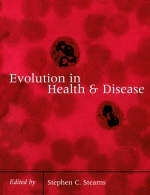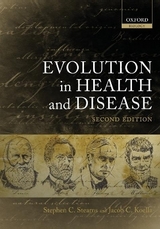
Evolution in Health and Disease
Oxford University Press (Verlag)
978-0-19-850445-0 (ISBN)
- Titel erscheint in neuer Auflage
- Artikel merken
Have you ever wondered how the disparity between the life experiences of our ancestors and ourselves might affect our health? For the majority of our evolutionary history, humans lived in small hunter- gatherer groups whose diet, lifestyle, living conditions, and environmental pressures were very different to the experiences of most humans today. The adaptations making us uniquely human - height, brain size, body proportions, metabolic rate, day range - were established during the Pleistocene - some 200 times as long as our recent evolutionary history - and may not fit us as well at the end of the 20th Century. This fascinating book explores and analyses the ways in which our ancient genes contend with, and influence, human life in the space age. It offers the first broad, in-depth coverage of the many points of contact between evolutionary biology and medical science. Evolutionary biology is not a standard part of medical education, but it offers many important insights into central problems of human health and disease.
These include the evolution of antibiotic resistance, the evolution of pathogen virulence, the evolution of ageing, the design of vaccines, and population- and genotype-specific reactions to drugs and susceptibility to disease. They also include new insights into mother-offspring conflict during pregnancy, menstruation, menopause, child abuse, homicide, depression, schizophrenia, and many chronic degenerative diseases, such as cancer and osteoporosis. This book, written by a team of world experts in evolutionary medicine, describes the state of the art, and provides easy, clear access to the primary literature. Addressed to medical students, medical researchers, and evolutionary biologists, it provides compelling arguments for why the tools of evolutionary biology - both its ideas and its methods - belong in every doctor's tool-kit.
PART I: INTRODUCTION; 1. Introducing evolutionary thinking; 2. Research Designs that Address Evolutionary Questions about Medical Disorders; PART II: HUMAN HISTORY AND HUMAN GENES; 3. The history and geography of human genetic diversity; 4. Medically relevant genetic variation of drug effects; 5. Genetic variation and human disease: The role of natural selection; 6. Human genetic variation and its impact on public health and medicine; PART III: NATURAL SELECTION, CONFLICTS, AND CONSTRAINTS; 7. Genetic conflicts of pregnancy and childhood; 8. Human evolution and disease: putting the stone age in perspective; 9. Pathogen-driven sexual selection and the evolution of health; 10. Evolutionary interpretations of the diversity of reproductive health and disease; PART IV: PATHOGENS, DRUGS AND VIRULENCE; 11. The population biology of anti-infective chemotherapy and the evolution of drug resistance: more questions than answers; 12. Development and use of vaccines against evolving pathogens: Vaccine design; 13. Evolution of infectious diseases: the impact of vaccines, drugs and social factors; 14. The evolution and expression of parasite virulence; 15. Molecular phylogenies and the genetic structure of viral populations; 16. The genetic population structure of pathogenic bacteria; 17. Whole-genome analyses of pathogens; 18. What can evolutionary biology contribute to understanding virulence?; PART V. NONINFECTIOUS AND DEGENERATIVE DISEASE; 20. An evolutionary perspective on the genetic architecture of susceptibility to cardiovascular disease; 21. The fetal origins of coronary heart disease and stroke: evolutionary implications; 22. The evolutionary context of chronic degenerative diseases; 23. Testing evolutionary hypotheses about mental disorders; 24. The evolution of non-infectious and degenerative disease
| Erscheint lt. Verlag | 15.10.1998 |
|---|---|
| Zusatzinfo | 2 halftones, line figures |
| Verlagsort | Oxford |
| Sprache | englisch |
| Themenwelt | Studium ► 2. Studienabschnitt (Klinik) ► Humangenetik |
| Naturwissenschaften ► Biologie ► Evolution | |
| Naturwissenschaften ► Biologie ► Genetik / Molekularbiologie | |
| Naturwissenschaften ► Biologie ► Humanbiologie | |
| Sozialwissenschaften ► Ethnologie | |
| Sozialwissenschaften ► Soziologie | |
| ISBN-10 | 0-19-850445-4 / 0198504454 |
| ISBN-13 | 978-0-19-850445-0 / 9780198504450 |
| Zustand | Neuware |
| Informationen gemäß Produktsicherheitsverordnung (GPSR) | |
| Haben Sie eine Frage zum Produkt? |
aus dem Bereich



